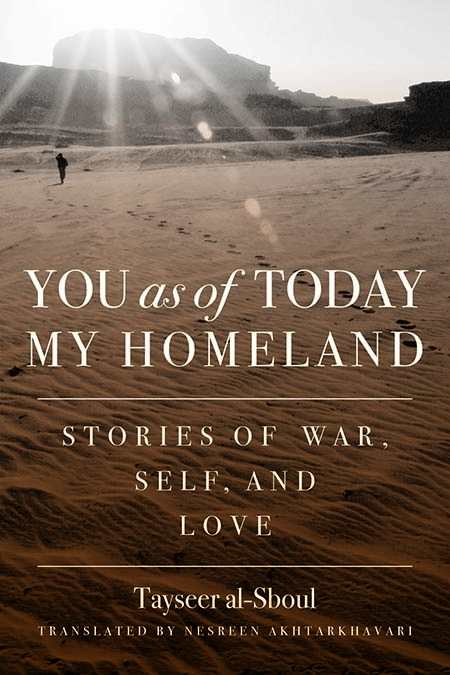You as of Today My Homeland
He expertly ties individual stories into larger themes of Jordanian identity, without losing focus on his narratives.
The late Tayseer al-Sboul was considered one of Jordan’s most respected writers, a poet and author with a knack for vivid description and for capturing the mood of his homeland. You as of Today My Homeland: Stories of War, Self, and Love collects three of his works, newly translated from Arabic to English by Nesreen Akhtarkhavari.
The titular story won a 1968 award as the best Arabic novel, but is closer to a novella in length. “You as of Today My Homeland” is set after the 1967 Six-Day War and is told from the perspective of two different narrators, with the text alternating between third- and first-person narration: a young man named Arabi, and a nameless fellow Jordanian. This postmodern approach can be a bit jarring at first, but it comes together nicely as the story progresses and the two perspectives join. The story opens with a description of the protagonist’s family, going on to chronicle Arabi’s relationships with women, the political divisions of the time, and the uncertainty of postwar Jordan. al-Sboul uses these small stories to tell a bigger story about how everyday Jordanians handled the changes that the war brought.
“Red Indian” is a short story set in 1960s Beirut, with a strong sense of place, taking a look at how Western and Eastern attitudes coexisted in the cosmopolitan cities of that time. The narrator’s father takes him to the cinema, where they root for Western heroes; the rest of the story shows the son moving away from his father’s attitudes until he comes to cheer for the Indians in Western films. “The Rooster’s Cry” tells of a newly freed former prisoner dining in the home of one of his friends from the inside. The title comes from the indignity of the rooster the hostess serves for dinner, its head resting in a pile of food, and symbolizes the prisoner’s mixed feelings about returning to society after his ordeal.
These stories are more straightforward than the title piece, but more affecting in their simplicity, and share al-Sboul’s deft and descriptive prose. He expertly ties individual stories into larger themes of Jordanian identity, without losing focus on his narratives.
Reviewed by
Jeff Fleischer
Disclosure: This article is not an endorsement, but a review. The publisher of this book provided free copies of the book to have their book reviewed by a professional reviewer. No fee was paid by the publisher for this review. Foreword Reviews only recommends books that we love. Foreword Magazine, Inc. is disclosing this in accordance with the Federal Trade Commission’s 16 CFR, Part 255.


